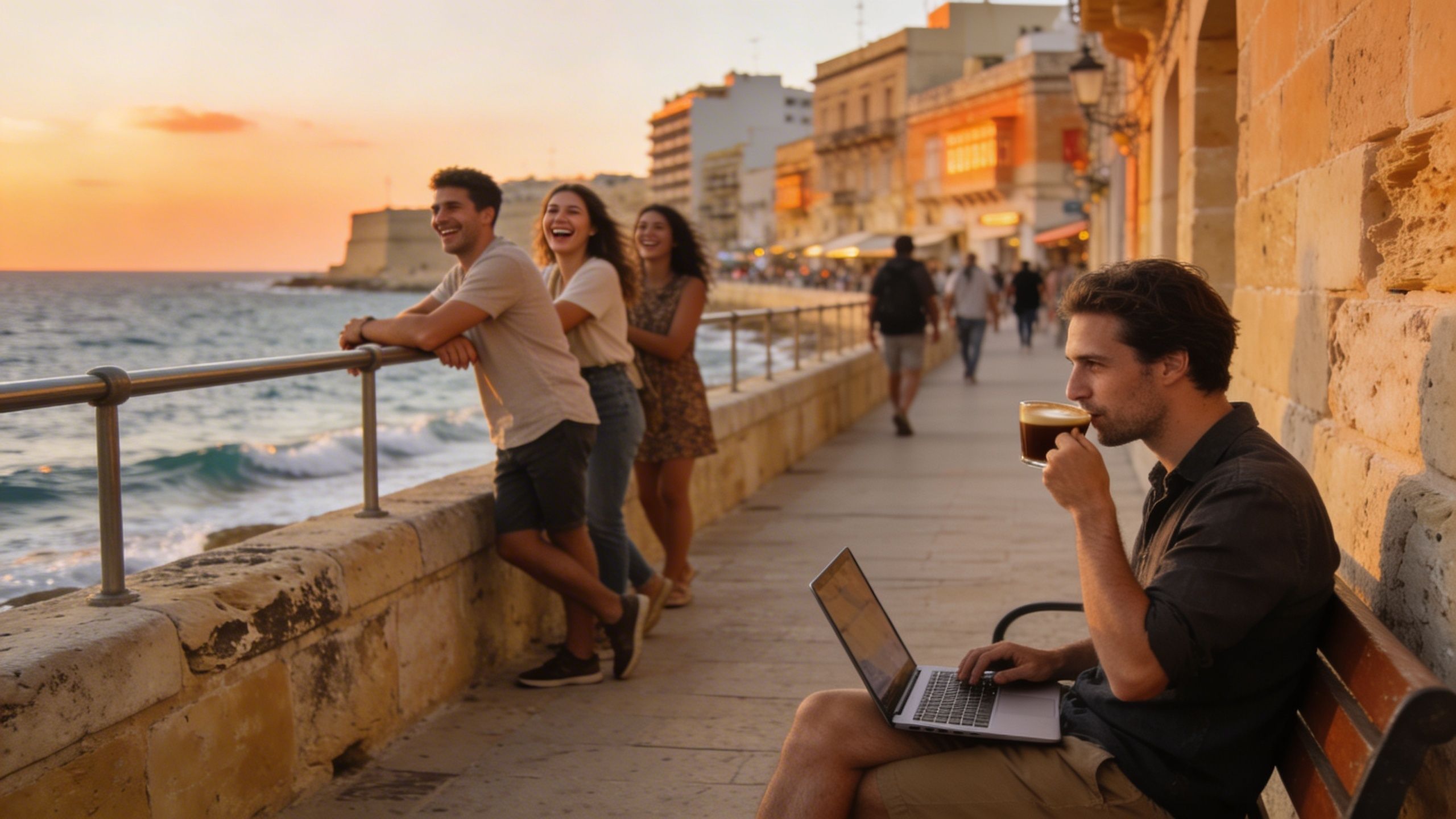France: Visas, neighbourhood vibes and move-ready steps
France pairs irresistible daily rituals with specific long‑stay visas (VLS‑TS, Passeport‑Talent). Learn neighbourhood vibes, visa steps and agent tips to make the move confidently.
Imagine sipping a café allongé on a sunlit terrace in Le Marais, laptop open, the hum of scooters and conversation folding into your work rhythm. Picture weekends roaming Provençal markets, rushing to a surf session on the Côte Basque, or trading evening walks along the Seine for a jazz night in Saint‑Germain. France isn’t a single mood — it’s a collection of daily rituals, neighbourhood personalities, and seasons that rearrange how you live. For nomads thinking long-term, that variety comes with clear visa choices, local rules, and property realities you’ll want to know before you book that one-way ticket.
Living the France life: neighbourhoods, rhythms and tastes

France moves at multiple paces. Paris is kinetic — tiny boulangeries at dawn, co‑working hubs by mid‑morning, gallery openings at dusk. The Riviera trades bustle for sunlit slow living: alfresco dining, beachside cafes, and a calendar of cultural festivals. Rural Burgundy and Dordogne are about market days, vineyard views and long meals. Each place changes the property you’ll want: a compact flat with excellent connectivity in the city, a sunlit apartment with a balcony on the coast, or a stone country house with a dedicated workspace and reliable fibre.
Paris & inner suburbs — urban life with coworking culture
Think fast metro, narrow streets, and cafes that double as summer offices. Hotspots like Le Marais, Canal Saint‑Martin, and Oberkampf buzz with meetups, boutique coworking (Morning, WeWork, local independents) and a huge range of neighbourhood cafés. For affordability and space, look to Montreuil, Saint‑Ouen or the 19th arrondissement for better rent-to-space value while keeping strong transport links into central Paris.
Riviera & Southern coast — sun, sea and seasonal pulse
Nice, Antibes and smaller coastal towns offer that Mediterranean rhythm: late breakfasts, long walks on the Promenade des Anglais, and a summer tourism surge that can shape rental income and seasonal traffic. If you need reliable internet for client calls, prioritise buildings with fibre or properties sold with confirmed ISP options — not all old seaside villas have upgraded lines.
Countryside & wine regions — slow life, bigger layouts
Bordeaux, Provence and the Loire valley win on outdoor space, gardens and lower prices per square metre. Expect different rhythms: local shops that close mid‑afternoon, weekly markets that are social anchors, and a stronger need for a car. These areas are perfect if you want room for a home office, a studio, or a terrace to host friends.
Making the move: visas, residency and real steps

The most common legal paths for remote professionals are long‑stay visas (VLS‑TS), the Passeport‑Talent categories for certain self‑employed or investors, and working‑holiday visas for eligible nationals. There’s no single “digital nomad visa” nationwide; instead pick the visa that matches your activity and length of stay, then register with OFII or the prefecture when you arrive. Start your application through the official France‑Visas portal and expect to provide proof of income, accommodation, and health insurance.
Passeport‑Talent: long-term options for entrepreneurs and skilled professionals
If you plan to set up a business, invest, or work long‑term for a French employer, Passeport‑Talent routes can grant multi‑year residency, but they carry requirements (minimum investment, contracts, or salary thresholds). These visas are ideal if you want stability and access to French social systems — and they make renting and banking simpler compared with temporary tourist stays.
Step-by-step: visa and settling checklist
Move with less friction by following a short sequence: apply for the correct long‑stay visa through France‑Visas, gather proof of income and health cover, confirm accommodation or rental references, arrive and validate VLS‑TS or apply for a residence card in the prefecture within the stated deadlines. Local embassies and the official portals list country‑specific fees and timelines — check early to avoid delays.
Insider knowledge: what expats wish they'd known
Expat life is warm and social — but administration in France takes patience. Expect slower bureaucracy, strong tenant protections, and neighbourhoods where local ties matter. Learning basic French unlocks more comfortable services and better rental outcomes. Many expats recommend joining local meetups, language exchanges, and coworking events to speed integration and find practical tips — from garbage collection days to the best local boulangerie.
Culture, language and daily routines
Daily life in France rewards presence: a market‑run on Saturday, a long lunch that’s social time, and evenings that favour lingering conversation. Respect local rhythms — many shops close between 12:00–14:00 in smaller towns — and you’ll fit in faster. For work, schedule client calls earlier or later in the day in summer when life spills outdoors.
Long-term lifestyle & property realities
Buying in France gives access to stable markets and a variety of property stocks — historic apartments with timber beams, modern flats with concierge services, and countryside stone houses. Factor in notary fees (typically 7–8% for existing properties), annual property taxes, and renovation needs. Work with an agent experienced in your target area: they’ll know local bylaws, copropriété rules, and whether fibre is already connected.
Quick checklist before making an offer
Before signing, verify the property’s energy performance certificate (DPE), ask about recent copropriété minutes, confirm internet providers and speeds for the address, and get a clear quote for local property taxes. If you plan to rent out seasonally, check local tourist rental rules: some cities (notably Paris) have strict short‑term rental regulations.
How a local agency helps your lifestyle match the paperwork
A good local agent is your translator — of both language and local reality. They’ll show neighbourhood tempo at different times of day, confirm whether a flat really gets afternoon light for video calls, and flag building quirks that affect remote working (noise, communal rules, elevator reliability). Choose agencies that specialise in expat clients and understand visa timetables — they’ll help sync moving dates with residence card processes.
Practical numbered steps to prepare (4 steps)
- 1. Choose the visa category and apply via France‑Visas with proof of income, insurance and accommodation. 2. Line up a local bank account and digital‑friendly services (Revolut, Wise or a French bank) so deposits and bills are smooth. 3. Book short‑term accommodation on arrival, inspect target neighbourhoods, and meet agents in person to test internet and commute. 4. Register with the prefecture/OFII within the deadlines to validate your long‑stay visa or apply for a residence card.
Lifestyle highlights: what makes France irresistible
France blends everyday pleasures with practical living — corner markets that become community, efficient rail links to explore neighbouring countries, and a café culture that doubles as informal coworking. You get quality healthcare, varied climates from Atlantic to Mediterranean, and deep local scenes for food, wine, cycling and hiking. That’s why many nomads shift from short trips to long stays or purchase second homes here.
Lifestyle highlights — quick list
- Weekly markets in Provence (Aix‑en‑Provence), early morning boulangeries in Paris (Le Marais), coastal surf breaks in Biarritz, wine‑tasting weekends in Bordeaux, coastal walks along Cap Ferrat
- Vibrant coworking scenes: independent spaces in Paris, Lyon and Marseille; outdoor work options in temperate months
- Reliable healthcare and strong public transport in cities; car recommended in many rural regions
- Stable property market cores (Paris, Côte d’Azur, major university cities) with pockets of value in second‑tier cities and countryside
France can feel like home fast — and buying there means mixing a dream lifestyle with local rules. Start with the right visa, meet local agents who specialise in expat transitions, and test neighbourhood life before you commit. If you want help matching a neighbourhood to your remote‑work needs (fast internet, comfy cafes, coworking and community), an agency that understands nomads will save you weeks of trial‑and‑error and unlock the life you imagined when you booked that first ticket.
Dutch investment strategist guiding buyers to Greece and Spain; practical financing, tax, and portfolio diversification.


